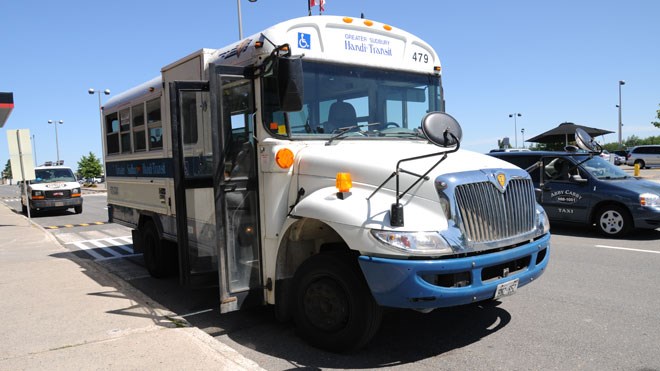Val Lauria is breathing a sigh of relief today after learning her autistic son won't be forced off the city's Handi-Transit system – at least for now.
Lauria learned this week that her son, Bradley, 22, can stay on Handi-Transit until her appeal is heard, sometime after the Oct. 27 municipal election.
Bradley doesn't have a physical disability, but his mother says he operates at the level of a five-year-old and is not capable of taking the bus on his own.
“In some ways, he's very self-sufficient,” she said. “But if you offered him a box of Smarties or $100, he would take the Smarties, not realizing he could buy boxes and boxes of Smarties with the $100.
“And he would go with strangers – he doesn't understand the danger.”
The city has been trying for several years to find ways to control soaring Handi-Transit costs, which has seen its budget and the number of users double in the last decade. Costs rose by $1 million between 2005-2009 alone, coming in at $2.75 million a year. At that rate, Handi-Transit costs would hit $4.8 million a year if ways to slow rising costs were found.
A 2011 audit by then Auditor General Brian Bigger recommended the city take advantage of their fully accessible fleet and encourage Handi Transit users to take conventional buses. Bigger also called for tougher eligibility rules to be considered for users to try and stem rising costs.
The city was aiming to divert 10 per cent of Handi-Transit users to the traditional system, which would save the city about $133,000 in 2015. Robert Gauthier, the city's manager of Transit operations, said the previous eligibility standards were created when the city had few accessible buses.
“You had to demonstrate whether you could climb three stairs – that's it,” Gauthier said. “There was a lot less detail in the application.”
With a fully accessible fleet of buses, as well as 14 Handi-Transit buses, Gauthier said it was time to update the city's policies. About 1,700 of more than 2,000 current users had to reapply. However, he said anyone who applies and is rejected can appeal.
“They have the option to appeal, and can continue to ride Handi-Transit until the appeal is heard,” he said.
While relieved, Lauria said she's concerned that because Bradly isn't physically disabled, she could lose. It would be devastating for the single mother, who lives in Capreol, works in Hanmer, but sends her son to day programs in Sudbury. He gets picked up at 7:50 a.m. each morning, giving her just enough time to get to work.
“I have a feeling we'll be good at least until January,” she said. “I'm relieved to have the extension.”
She's grateful for the media attention her story received, and credits the coverage to an online petition started by her friend, Sherry Desjardins. As of Wednesday morning, it had attracted more than 2,200 signatures. It can be viewed at www.petitions24.com/developmentally_challenged_have_been_denied_access_to_services.
Join Sudbury.com+
- Messages
- Post a Listing
- Your Listings
- Your Profile
- Your Subscriptions
- Your Likes
- Your Business
- Support Local News
- Payment History
Sudbury.com+ members
Already a +member?
Not a +member?
Sign up for a Sudbury.com+ account for instant access to upcoming contests, local offers, auctions and so much more.
